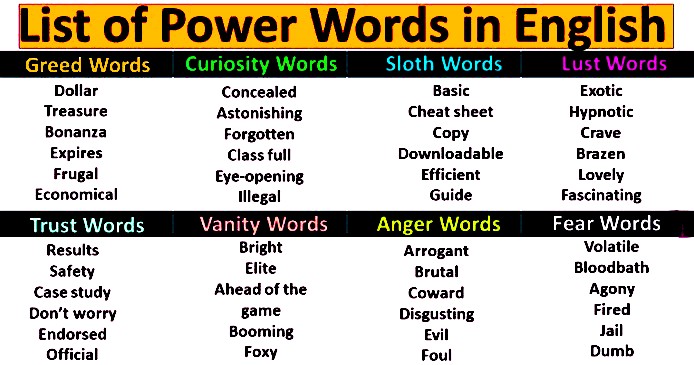Powerful Words List is a game-changer for anyone looking to elevate their vocabulary, whether for academic writing, professional communication, or everyday conversations. Using impactful words not only enriches your language but also makes your ideas more compelling and persuasive.
A strong vocabulary allows you to communicate with clarity, precision, and confidence. Instead of relying on overused words like “good” or “bad,” having a repertoire of Powerful Words List options helps you convey emotions, opinions, and descriptions with depth.
Why Learning Powerful Words Matters
Expanding your vocabulary goes beyond memorizing words; it shapes the way you think, write, and express yourself. Powerful words create a lasting impression on readers, listeners, and colleagues.
For example, saying “The results were phenomenal” carries more impact than simply stating “The results were good.” By incorporating words from a Powerful Words List, your communication becomes more professional, persuasive, and memorable.
Common Categories in a Powerful Words List
A well-rounded Powerful Words List includes words from various categories to cover different contexts. This ensures you have the right word for every situation.
Emotions: ecstatic, sorrowful, content, frustrated
Descriptive: vibrant, meticulous, colossal, fragile
Action Verbs: empower, enhance, transform, accomplish
Adjectives for Persuasion: compelling, remarkable, exceptional, influential
Using these words thoughtfully can transform ordinary sentences into impactful expressions. For instance, instead of “She is very smart,” you could say, “She is exceptionally insightful,” which conveys both admiration and specificity.
Techniques to Incorporate Powerful Words
Integrating words from your Powerful Words List into your daily writing and speaking is essential for mastery.
-
Contextual Usage: Understand the meaning and nuances before using a word.
-
Writing Practice: Replace generic words in your writing with powerful alternatives.
-
Daily Conversations: Use these words in emails, discussions, and social media posts.
Example: Change “I need help with this task” to “I require guidance to accomplish this task efficiently.” This subtle shift demonstrates confidence and sophistication.
Real-Life Applications
In professional communication, using words from a Powerful Words List makes a significant difference.
-
In emails: Replace “I think this is good” with “I strongly believe this is a remarkable solution.”
-
In presentations: Instead of saying “Our project is successful,” you could say “Our project has achieved outstanding results.”
-
In essays: Swap “The story is interesting” with “The narrative is captivating and thought-provoking.”
These changes enhance the clarity and impact of your message.
Synonyms and Word Variations
One of the key strategies in using a Powerful Words List is understanding synonyms and variations to avoid repetition.
For example:
-
Excellent → outstanding, remarkable, exceptional
-
Important → crucial, vital, significant
-
Happy → joyful, elated, content
By varying your word choice, you maintain reader interest and demonstrate linguistic versatility.
Boosting Vocabulary Through Reading
Reading is one of the most effective ways to expand your Powerful Words List. Books, articles, and reputable online sources expose you to rich language and contextual usage.
Take note of unfamiliar words and explore their meanings, pronunciations, and proper applications. This habit gradually enhances both your active and passive vocabulary, enabling more expressive communication.
Writing Exercises to Reinforce Learning
To internalize your Powerful Words List, practice writing exercises such as:
-
Rewriting paragraphs using more impactful words
-
Crafting short stories or essays with a focus on descriptive language
-
Journaling thoughts using precise and persuasive vocabulary
These exercises help solidify understanding and promote natural usage in everyday communication.
Speaking Confidently with Powerful Words
Vocabulary isn’t just for writing; it significantly affects verbal communication. Using words from a Powerful Words List in discussions, presentations, and public speaking boosts confidence and credibility.
Example: Instead of saying, “This idea might work,” say, “This strategy is highly effective and poised for success.” This choice of words conveys certainty and professionalism.
Online Tools and Resources
Digital tools like thesauruses, vocabulary apps, and word-of-the-day notifications can help you consistently learn new words. They are excellent resources to expand your Powerful Words List and practice contextual usage.
Common Pitfalls to Avoid
While using a Powerful Words List is beneficial, overusing complex words can make writing sound unnatural or pretentious. Balance is key.
Use powerful words where they naturally fit, and prioritize clarity over complexity. Your goal is to enhance communication, not confuse your audience.
Long-Term Benefits of a Strong Vocabulary
A robust Powerful Words List improves academic performance, career prospects, and social interactions. People with strong vocabularies are often perceived as articulate, intelligent, and persuasive.
It empowers you to express ideas succinctly, argue points convincingly, and leave a lasting impression, whether in professional or personal contexts.
Practical Examples from Daily Life
-
Professional email: “I appreciate your efforts” → “I sincerely commend your exceptional efforts.”
-
Casual conversation: “I am tired” → “I feel utterly drained after today.”
-
Writing a review: “The product is good” → “The product is remarkably efficient and reliable.”
These examples show how small changes using a Powerful Words List can make a significant impact.
Read also:
apricity
juxtaposition examples
juxtaposition
interjection definition
